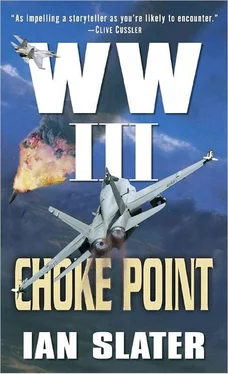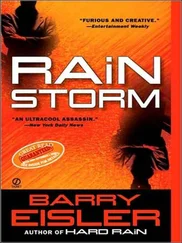Marte touched Riser’s hand. “I’m sorry I can’t do any more. You understand — rumor, speculation, is one thing. It’s concrete evidence we need.”
He felt selfish, and after a long pause, nodded. He understood. He turned attention away from himself. “How are things up here?”
“Not good. Jensen is dispatching two new state-of-the-art sub-hunter hydrofoils from San Francisco, in a couple of those monster Globemasters. But all our ships that were sunk, including the Utah , were supposed to have state-of-the-art antisub stuff aboard.”
“This Jensen,” Charles asked. “He’s the sub admiral, right?” He didn’t really care; he just wanted to hear her talk. The last woman who’d touched him like that had been his wife, Elizabeth. It seemed a thousand years ago. He felt utterly exhausted, unable even to will himself to move.
“Jensen is— was —COMSUBPAC Group 9,” replied Marte. “He sent a Coast Guard ship, the Skate , in to help. In horrible search conditions. Everything socked in by fog.” There was a pause. “Look—” she began.
Her producer was anxious and gestured at her. In three minutes she was to give a report on the sea of refugees still moving south into Oregon and California.
“Have you got a picture of Amanda?” she asked Charles. “Anything we might use if something breaks?” It was a question she’d asked scores of bereaved parents during her reporter’s career.
He had a lot of pictures of Mandy, one with Wu Ling.
“ ’Course,” said Charles, “you’ve got one of this—” He paused. “—animal.” It was the same computer-enhanced photo of Li Kuan that the CIA and other agencies had, the terrorist’s pockmarked bald scalp and hazel European eyes in stark contrast to his otherwise distinctly Chinese features. The pockmarked scalp gave Kuan what Charles told Marte was a particularly sinister appearance, even for a terrorist.
In her twenty years as a correspondent, Marte had seen terrorists and other cold-blooded killers, such as Ted Bundy, who looked almost angelic, so Li Kuan’s appearance did not unduly affect her. “Yes,” she said, handing the photo back to Charles, “we already have this on file. Everyone has, Charles. It’s the only one, and as you can see, not a particularly useful one.”
She was trying to explain to him that you just can’t stick someone’s photo on TV, even that of a terrorist, and say they’re linked to Beijing — that they’re in cahoots — without proof. And there had been absolutely no evidence from any of the media feed she was getting that the Muslim terrorists had anything to do with China’s push against Taiwan.
“But,” Charlie Riser countered, “Muslim terrorists everywhere hate Americans.”
“Yes,” she conceded, “they do,” but she knew it was a non sequitur, Charlie Riser understandably fixated on the terrorists because of his daughter’s murder. Marte empathized. She remembered the terrible murder of Daniel Pearl, the Wall Street Journal reporter who’d been captured by the Taliban in 2002, horribly tortured and then executed, his grisly death videotaped by the terrorists. Pearl left a grieving wife and an unborn son behind. Even the hard-bitten types amongst the international media had been shocked.
Charlie Riser looked over at her and said, “I have a gut feeling that Li Kuan is behind these sub attacks. You know,” he told Marte, “he tells Beijing, ’You help us hit the Great Satan and we’ll be no trouble in Kazakhstan.’ “
Marte Price’s producer gave up on his earlier polite tone. “Marte! Ten seconds!” he shouted.
She put her hand on Charles’s. “I’ll do what I can, talk to Freeman — see what he has.” With that, she rose quickly and got back in front of the universal eye.
“Five seconds, Marte.”
“Proof,” she said to Riser. “Concrete proof. If your friend Chang manages to smuggle out any concrete proof to Wu Ling — call me.”
Then she was back on air.
State had been looking for Charles everywhere, and when he got back to Seattle, the tall girl was waiting, trying to be very stern. “Washington expected you in D.C. today.”
“Did they?”
“Yes, and I’ve been told you’re to leave on this evening’s flight from SeaTac.”
“I’m embarrassing the department.”
“Well — yes.”
“All right,” he sighed. What else could he do? He’d been trained in diplomacy. It was all he knew. “I’ve done my best,” he said.
The tall girl from State could have sworn he wasn’t talking to either her or himself. It was as if someone else was in the room.
Freeman’s “jimmy leg,” as his team had always referred to the sudden jerks the general’s limbs would make while he was asleep, was getting worse — and alarming to anyone who’d never seen the medical condition.
“Is he okay?” one of the side-scan techs asked Frank Hull.
“He’ll be fine,” responded Frank, whose eyes were glued to the profile coming up on the new roll of paper.
“Geez, I wouldn’t want anyone to see me like that.”
“He always wants to be near the action,” said Frank. “Besides, I don’t think anyone’s told him. You could, if you want.”
“I don’t think so.”
The other technician, like Hall, was watching the slowly emerging outline of the sea bottom, never tiring of the side-scan sonar’s magic. You sent down an invisible sound wave, and back it came, morphed into a visible line that formed a part in the larger jigsaw pattern of echoes whose overall picture should soon tell them if there was a sub down there or not. The tech hoped not — he’d witnessed enough action for a lifetime, the sight of the terrorists that Freeman had killed ironically more troubling to him because, unlike the American dead from the multiple sinkings, rigor mortis had not yet set in. The one Freeman had been staring down at looked as if he was still alive, eyes open. The penny-on-the-eyelids thing one of Petrel ’s crew had tried failed to keep the eyelids shut, the coins falling off because of residual muscle movement that had sent the pennies running across the deck, which Tiny confessed had “totally freaked” him.
“Those hydrofoil sub chasers Jensen’s sending up to Everett,” the tech said to Frank, “they should be here soon, right?”
“Half an hour, maybe more,” replied Frank, eyes still on the trace. “Everyone goes slow in the fog.”
“And,” put in the other technician unhelpfully, “it’ll soon be dark.”
Freeman’s leg shot out.
“Jesus Christ—”
“Settle down,” Frank told the tech. “If that slab we saw earlier was the sub lying low, it might be gone by now, under cover of our prop disturbance during the firefight.”
“Looks like we’re back at the site, Captain!” one of the techs said excitedly.
Frank nodded.
Freeman’s “Jimmy leg” had started up again, which caught young Cookie’s attention. Overloaded with a tray bearing thick white mugs of coffee and hot chocolate for dry lab and stern watches, he stepped over the lab’s door. “No beer, I’m afraid, gents,” he announced cheerfully, resolved to show that corpses on deck didn’t scare him . He could handle it.
“Thanks,” said Frank, without looking up. “Away from the recorder, son.”
“Don’t have to worry, Cap—”
“Stop engines!” Frank shouted into the intercom. Barely any movement resulted, but in the slight yaw of the ship, Cookie lost his balance, an avalanche of white mugs spilling chocolate and coffee crashing onto the dry lab’s floor.
“Wha …?” Freeman was up, one arm around Cookie’s neck, the other holding the K-bar’s blade an inch from the man’s throat.
Читать дальше












